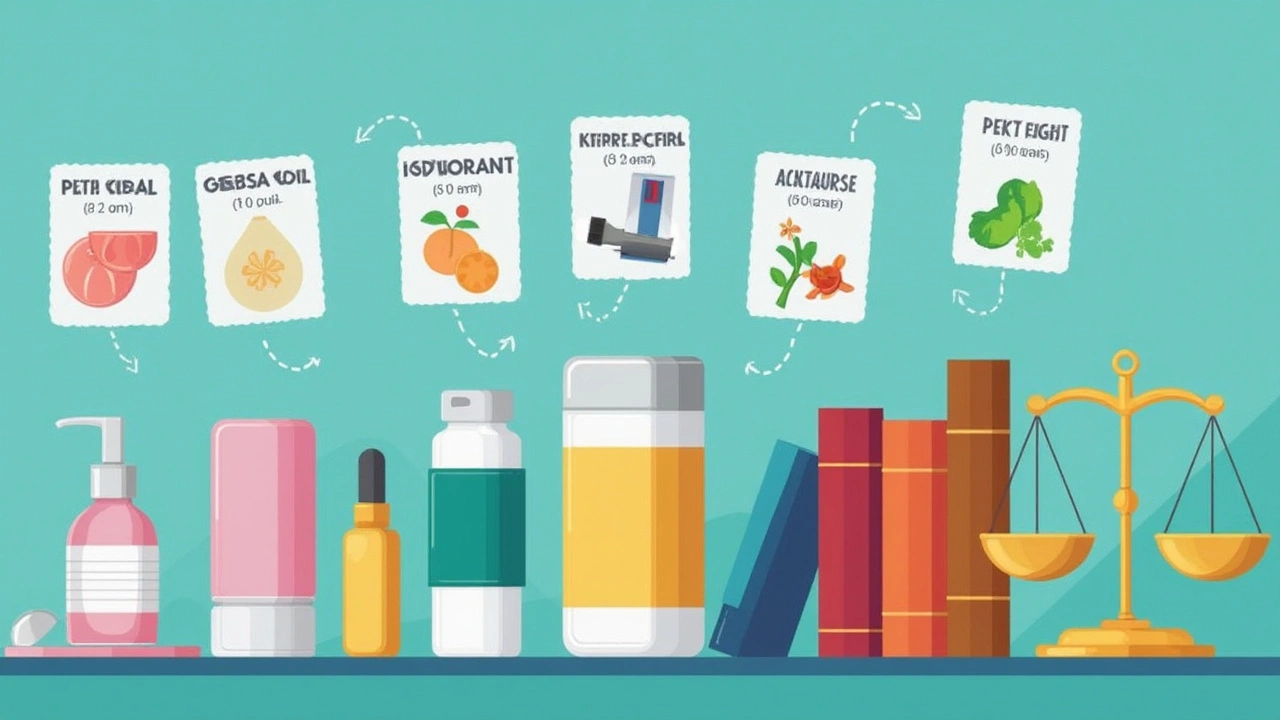
Ever wondered if your trusty deodorant counts as a cosmetic or something else entirely? It might surprise you! While cosmetics generally focus on enhancing appearance or fragrance, deodorants actually have their own special niche.
So, why even consider deodorants as cosmetics? Well, it’s mostly because they aim to control body odor by masking it with a pleasant scent, much like perfumes. However, the real plot twist is when you start looking at antiperspirants, which actually stop sweat. Yep, they go beyond just making you smell good!
Confusing? Maybe a bit. But in the world of personal care, these distinctions make a huge difference in how these products are perceived and even how they’re marketed. Plus, knowing what each product does helps you pick what’s best for you. Stay tuned as we dive deeper into how deodorants work, what sets them apart, and handy tips for picking the one that's right for you!
- What Makes a Product Cosmetic?
- The Science Behind Deodorants
- Deodorant vs. Antiperspirant
- How to Choose the Right Deodorant
- Surprising Benefits of Deodorants
- Legal Classifications and Implications
What Makes a Product Cosmetic?
Alright, let's get right into it. The big question: what makes something a cosmetic? The short version is that it's all about making us look or smell better. A product falls into the cosmetic category if it's used for cleansing, beautifying, promoting attractiveness, or altering appearance.
According to the Food and Drug Administration (FDA) in the U.S., cosmetics include products like skin moisturizers, perfumes, lipsticks, fingernail polishes, eye and facial makeup preparations, shampoos, and even certain substances like deodorants aimed purely at managing body odor. They’re not intended to affect the body's structure or functions. So, something that just makes you smell nice? Yep, that’s cosmetic.
"A cosmetic can be defined by its intended use, which is more about changing how we look and smell without altering our body's structure," says Dr. Jane L. Collins, a leading dermatologist.
But, here's where it gets interesting. Products that deal with basic hygiene, like reducing sweat or fighting germs, sometimes sneak over to the drug side of the line. Antiperspirants, which actually reduce perspiration, are considered both cosmetics and drugs in places like the United States. Weird, huh?
Check out the breakdown:
- Deodorants: Considered cosmetic as they just cover up odor.
- Antiperspirants: Seen as both cosmetic and drug because they prevent sweating.
The magic of marketing and regulatory definitions can make this world a bit tricky. And, as we swirl our way through the shelves of personal care products, knowing what category a product falls into helps make better choices for our needs.
Next time you're at the store pondering over choices, remember: it’s the function and not just the name that defines if a product is a cosmetic. It's not just about swooning over the smell; it actually matters how these products fit into our personal care routine.
The Science Behind Deodorants
Alright, let’s get a bit nerdy here and explore what makes your deodorant tick. At the heart of it all, deodorants aim to keep you smelling fresh by tackling the bacteria that cause body odor. These products contain antimicrobial agents that slow down the growth of bacteria on your skin. Fewer bacteria mean less stink when you start sweating!
Most deodorants contain alcohol, which quickly evaporates and leaves behind a nice scent. This alcohol not only gives the product a cooling feel on your skin but also serves as a short-term bacteria fighter. If you're going alcohol-free, brands often use alternative antimicrobial ingredients such as triclosan or naturally derived oils.
So, what’s the lowdown on the difference between deodorant and antiperspirant? It's simple. While deodorants focus solely on odor, antiperspirants go a step further by reducing sweat itself. They contain aluminum compounds that temporarily block sweat glands, keeping you dry.
Here’s a fun bit of trivia: Did you know that the U.S. FDA considers antiperspirants as over-the-counter drugs due to their effect on the body’s normal sweating process? That's a quirky little fact that plays into how these products are designed and marketed.
And if you’re thinking “But I don’t sweat much, do I need all this?” The answer is: it depends on your priorities. Diverse formulations, including natural options, make it easy to find something that fits your skin needs while keeping you feeling confident and fresh!
Deodorant vs. Antiperspirant
Alright, let's settle this once and for all: what's the real deal between deodorant and antiperspirant? Though often lumped together, these products do distinct jobs. Understanding the difference helps you choose what's best for your needs.
Deodorants are all about fighting odor. They don't stop sweat; instead, they work by targeting the bacteria that cause odor. Most deodorants use antibacterial agents to keep those pesky bacteria at bay and contain fragrances to mask any lingering smells. If your main concern is just staying fresh, deodorant is your go-to buddy.
Now, antiperspirants take it up a notch. They prevent sweating by temporarily blocking sweat glands with active ingredients like aluminum compounds. This not only helps reduce wetness but also tackles odor since the bacteria don't get the moisture they love. So if sweating, not just odor, bugs you, antiperspirant might be better.
Here's an interesting tidbit: in some countries, antiperspirants are considered over-the-counter drugs because they actively change the body's function, while deodorants remain classified under cosmetic products. It's an odd little twist in the personal care world!
Oh, and one last thing—some products are hybrid, combining elements of both deodorants and antiperspirants. These can be great if you want the best of both worlds, offering fragrance and sweat control in one swipe. So next time you're browsing the aisle, check the labels, and see which fits your routine.
In short, whether you go for deodorant or antiperspirant, understanding these distinctions makes it easier to make an informed choice. Your armpits will thank you!

How to Choose the Right Deodorant
Picking the right deodorant can feel like navigating a labyrinth of scents, sprays, and skin concerns. The choices are seemingly endless, but fear not, it's simpler than it seems. Here's how to find your perfect match.
First off, decide what you need. Are you tackling odor, sweat, or both? If it's just about smelling fresher, a deodorant will do the job. But if you want to keep sweat at bay too, you should look for an antiperspirant. They often sit side-by-side on the shelves, so check those labels closely!
Next, consider your skin type. Sensitive skin? Look for deodorants with soothing ingredients like aloe or chamomile. Trust me, your underarms will thank you. Also, check for alcohol-free formulations if irritation has been a past problem.
The delivery method is another angle. Do you prefer a quick spray, a roll-on, or a stick? Each has its pros and cons — sprays are easy and fast-drying while sticks offer precision but can leave residues.
Let's not forget about scents. Whether you're into floral, citrusy, or something more musky, make sure it aligns with your personal style. And if you're sensitive to fragrance, fragrance-free options are pretty abundant these days.
- Go through the ingredient list if you're eco-conscious or looking for vegan options. Many brands now highlight if they’re cruelty-free or made with natural elements.
- If budget's a factor, there's something in every price range. Drugstore brands work wonders without breaking the bank.
- Don't shy away from trying mini or travel-sized bottles first — that way you can sample without full commitment.
Remember, the goal is finding something reliable that fits into your daily rhythm like a well-loved pair of shoes. It might take a little trial and error, but soon you'll land on the personal care product that gets the job done while making you feel fabulous.
Surprising Benefits of Deodorants
Alright, we all know that deodorant keeps those pits smelling fresh, but did you know it’s got some unexpected perks too? Let’s dig into some lesser-known benefits that might make you appreciate this humble product even more.
First off, deodorants can help prevent chafing. Ever dealt with the raw skin that seems to scream every time you move? A little swipe of deodorant can actually help reduce friction on your skin, making it your secret weapon on those hot, sweaty days or during a workout.
Got new shoes? Here’s another cool use—rub a bit of deodorant on your feet to avoid blisters. The formula acts as a barrier and reduces moisture, meaning less rubbing against those new kicks. It’s your new best friend when breaking in shoes!
For the bold ones, you can even use it on your thighs or arms to take the edge off irritation. It’s a super-simple hack that can make a world of difference for comfort.
Now, who doesn’t love to get more life out of their razor? Some folks find that using deodorant on their legs after shaving helps with redness and bumps. The soothing elements in some cosmetic products can offer gentle care to freshly shaved skin.
Finally, let’s not forget its role in smelling good. Not only for your armpits! You can swipe some on your neck or even behind your knees for an extra hint of that sweet, fresh personal scent.
As you can see, deodorant is way more than just an odor-fighter. Whether it’s keeping your heels blister-free or ensuring smooth shaves, it’s a versatile item worth having in your personal care lineup.
Legal Classifications and Implications
Alright, let's get into the nitty-gritty of how deodorant fits into the legal landscape of cosmetic products. In many countries, there's a cool twist: Deodorants and antiperspirants fall under different categories, even though they’re shelf buddies!
In places like the United States, the Food and Drug Administration (FDA) makes a distinction. Deodorants are usually classified as cosmetics because they freshen things up without changing how your body works. Antiperspirants, on the other hand, fall into the drug category because they use ingredients like aluminum to actually block those sweat glands. Crazy, right?
Meanwhile, Europe plays it a bit differently. The European Union considers both deodorants and antiperspirants as cosmetics unless they make medical claims. This means you won’t see much difference in how they're regulated unless someone promises they'll prevent you from sweating bullets during a workout.
So why does all this matter to us? Well, this classification affects what companies can say about their products, and kind of guides which ingredients they use. Plus, it impacts the testing and safety protocols that these products have to go through.
And for those who love random trivia, here's a fun stat: A report by Allied Market Research found that the global deodorant market was valued at about $22 billion in 2022 and is expected to reach $39 billion by 2031. Now, that's a lot of fresh pits!
Understanding these legal categories can help us make smarter decisions. Whether you're all about ensuring your products are cruelty-free or just trying to avoid certain ingredients, knowing the legal side of personal care products gives us that extra bit of power.